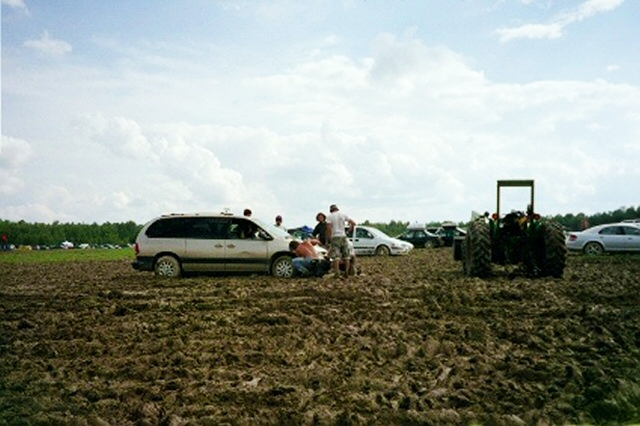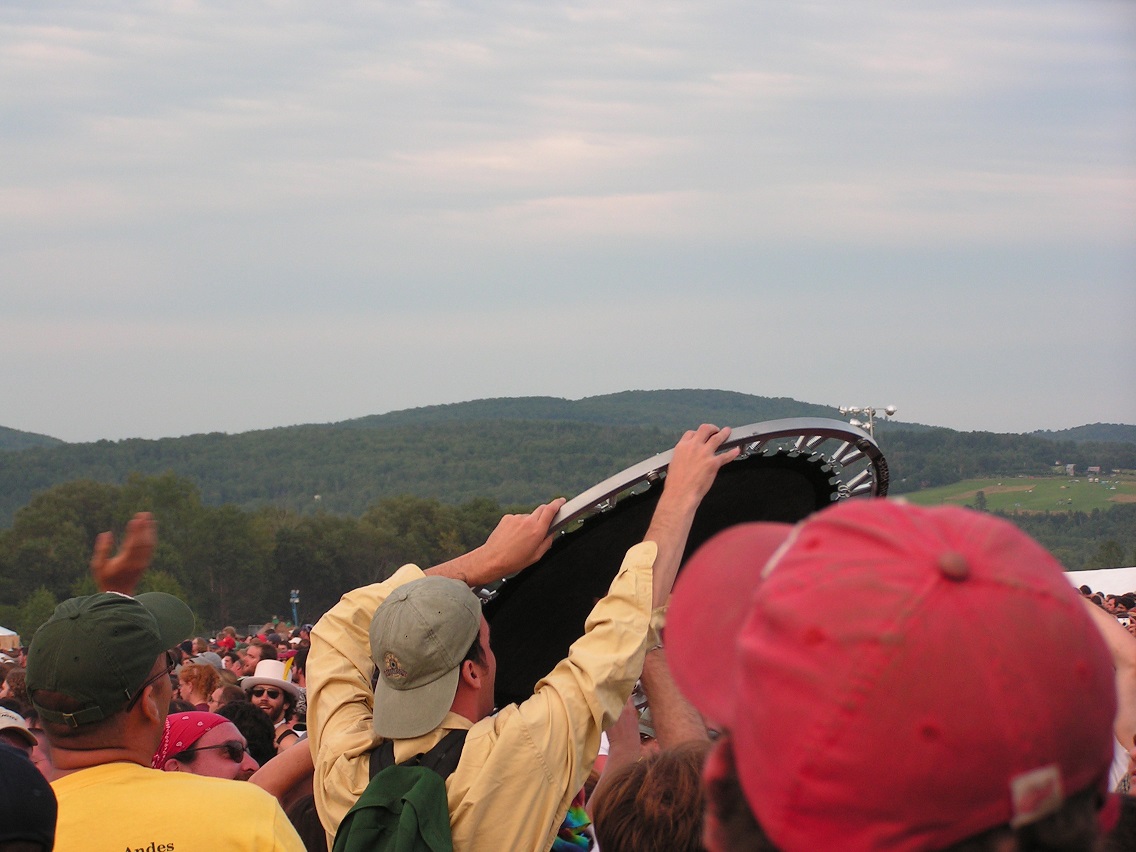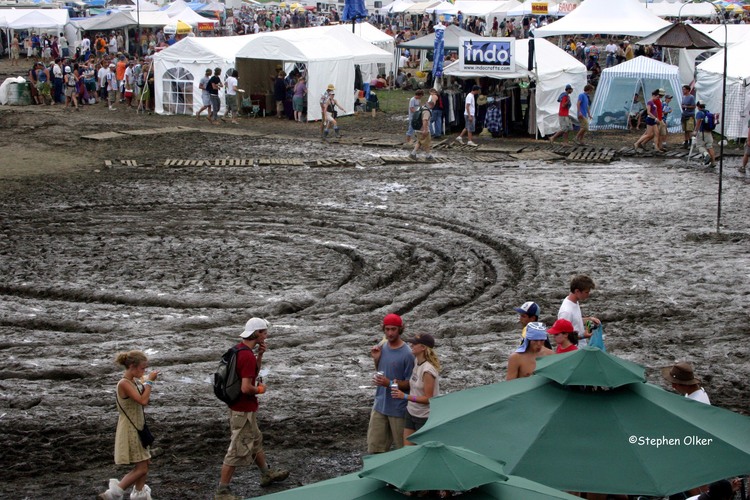BLOG POSTS WHERE MONTH IS 8, AND DAY IS 14, AND YEAR IS 2014
COVENTRY: TEN YEARS LATER
It was ten years ago, on August 14, 2004, when Phish began one of the most anticipated and emotionally-charged concerts of their career. The very word “Coventry” is a deeply meaningful, if not painful, trigger among fans, given the festival's extraordinary and tragic circumstances. Coventry’s music is full of staggering contradictions, in that it is at times ponderous and exciting, dour and joyful, miserable and soul-expanding. The art of Coventry is revisited here not only in honor of its 10th Anniversary, but also out of love for Phish and their music, warts and all.
In the event you don’t know the background of Phish’s shows in Coventry, here’s the short version: The shows were billed as the last shows that Phish would play. Ever.
Take a moment to breathe that in.

Imagine how you’d feel if Phish announced that the Vegas shows over Halloween weekend would be the last shows that they would ever play. That’s it, no more shows after Vegas! No NYE run, nothing next year, no more shows. Period. Would you try to go to Vegas, even if you hated extremely-large crowds, or Nevada for that matter? Would you view the shows—before they were even performed—as potentially the most important rock concerts you may ever experience in your life, what with your favorite band declaring them to be their LAST SHOWS!? And during the shows, whether you were watching the webcast or present in the flesh, would you try to keep in mind that every version of every song you were hearing and seeing would be it—the very last version of that song that would ever be performed by Phish?
Now, in the weeks before their final shows at Coventry, how do you think the band felt? How do you think Trey, Mike, Page and Fish were feeling on August 14, ten years ago, when they took the stage well-aware of their fans’ incalculably-great expectations? As Trey even claimed during the 8/15 show, he had never been nervous at a Phish show before, but that night he was “a little nervous.”
Months before it had occurred and sold out, and even before it was announced that the shows would be broadcasted live to a number of theaters across the country, the Coventry festival already was, and would be, a profoundly sensitive event for fans and the band. And then the rains came. And came. Coventry was inundated in the weeks before the shows by so much record-breaking rain that the grounds were terribly muddy, even disastrously so in some areas.

Photo © Nick Ninfa
If you weren’t there, imagine the worst mud you’ve ever been stuck in. And then smear it all over yourself and your loved ones, and lose your boots in it, and then go somewhere to wash it all off, and seemingly wash it all off, but then somehow you still manage to vaguely smell it lingering somewhere, but you’re unable to put your nose on where, and it still unsettles you, several days later. Coventry’s mud was like that.
The grounds were in such poor shape that fans on the road—while en route to the shows—had been asked repeatedly by the band via the Bunny to return home! When fans showed up to park, RVs and cars got stuck left and right, traffic backed up for many miles, and thousands of fans abandoned their vehicles and hiked (carrying, dragging their stuff) to the venue. A venue whose grounds were so muddy (with dollops of manure) that expansive areas were simply uninhabitable.
Before the band had played even a single note, Coventry was about far more than just the music. To this day, the love exhibited by the fans for the band, having walked all those miles into a literally-shitty venue, is inspiring. And, despite the literally-shitty scene, Phish nevertheless managed to be musically intimate, and memorably so, with tens of thousands of their fans.

Photo © Nick Ninfa
It’s arguably unreasonable to compare Coventry’s music, like that of Big Cypress, to the music of other shows. These two monumental events in Phish history really do seem “beyond compare,” given the emotion that they involve, which dwarfs that of the typical show, and even that of the typical three set festival show. Coventry was billed to be the final Phish festival, and to include the final Phish shows, nearly four years after Phish had played—for more than six hours straight on a reservation in Florida at the dawn of a new millennium—what is still considered to be one of the greatest concerts in rock and roll history!
That said, it’s impossible for some of us to avoid comparing and contrasting jams and versions of Phish’s songs with each other. And making comparisons arguably becomes a Moral Imperative when, for example, someone speaks about Coventry’s music in a manner that is either outright false, or at least demonstrably ignorant. Sure, there was plenty to be upset about at the shows, musically and otherwise. Those of us who were there were active participants in what was likely among the largest wakes held in U.S. history. The "vibe" at times was cheerless, and even grave.
From the mud or the theater, we were effectively witnessing the death of a legendary band, and it is challenging to be joyful under such circumstances even if accompanied by angelic music. When four of your most beloved musicians who love each other very much are in mourning as they perform, you’re predictably melancholic. And the technical mistakes that were made during the shows were so clear that even the deafest among us can hear them. But in context, are they not understandable, if not forgivable, in the light of the love explicitly expressed by the band for us fans?
Some would say “no.” Trey, or the band, should have done this, or done that, instead of this, or that, given X, or Y, and because of A, B and C. But can any among us say that they have performed a concert before over 70,000 of our fans that was billed to be the last concert? Imagine the weight of that. Of course, if you’re the sort of fan who mostly cares about whether the composed sections of songs are played well, and don’t care much for improvisation, it makes some sense that you dislike Coventry’s music—if you’ve even made the effort to hear the shows at all. But there are too many wonderful, even transcendent, musical performances by the band to ignore or forget. When Trey, Mike, Page and Fish were “on” that Coventry weekend, their music reached as majestic a peak as it ever has.
“That’s bullshit,” you might be thinking.
Photo © John Crouch
If you’re thinking that, or even if you’re not, please take a mere thirty seconds—even if you think you remember them all—to skim some of the musical highlights of August 2004, listed for your convenience here. And then do yourself a favor and actually (re)listen to some of them.
Don’t be surprised if, when you hear them again, some of Coventry’s highlights stand-up in comparison with the most spirited and thrilling improvisation of the last decade, including masterpieces like the Tahoe “Tweezer,” the Gorge “Rock and Roll->Meatstick,” the Pine Knob “Down with Disease,” the Randall’s “CDT” (or Dick’s, of course!), Hampton’s “Carini,” the Greek “Cities,” and so on and so on. Most recent versions of “CDT” have been exceptional, as you know, but don’t overlook Coventry’s, not to mention Hampton’s, which are also well above-average versions with stellar improv throughout them.
As grueling and disturbing as the Coventry weekend was, many positive, life-affirming and soulful events still occurred not only on stage, but also in our lives as fans of Phish. Some of those highlights include the following, and please add to this list in the Comments—or “Remembrances,” if you prefer—below:
- Trey’s melodic soloing in “Jibboo” (compare this version to the one in Portsmouth a few weeks ago; I’d be surprised if you didn’t like Coventry’s a lot more);
- Trey’s hinting at “Manteca” during the jam segment of “YEM,” after they had given away the trampolines;
- Tom Marshall’s “Rye rye rocco. Marco Esquandolas. Been you to have any spliff man” during the “Antelope,” which is one of the more chaordic versions on record, and is more intense than nearly every version performed since then (but don’t take my word for it; listen to them all, or at least those on the jam chart, and hear for yourself); and notably, at the end of "Antelope," Trey sends "our deepest love" to the fans who had managed the traffic and then walked to the venue;
- The soupy, cacophonous, blazing haze in “Fire,” shortly before they returned to the theme and closed the version and the first set strongly—an unusual and all-hallowed version of “Fire” for sure; in fact, this first set, despite Trey’s flubs, given its massive quantity of improvisation, is among the most improvisationally-almighty first sets in Phish history;

Photo © Seth Blankensop
- A magnificently melodic (for a spell) “AC/DC Bag,” which is among the finest versions in history, helped bring IT to start the second set on August 14, and has diverse improv illustrating the fascinating evolution of this tune’s jam segment over the decades;
- The on- and off-the-rails, dark and terrifying-at-times, 20+ minute “Stash;”
- An extremely-atypical “Free,” where Trey and Mike were in a duet for awhile (had this version been performed this summer, it would be a highlight of 2014 for sure);
- The jamming during the “Drowned” around the 21-23 min point, when Phish hoses everyone down and the jam reaches a transcendent peak; improv of this caliber is why Phish is an incredible rock band, and the fact that in 2014 they can still jam like this makes them worth seeing over and over and over again (especially for only $60 a ticket);
- 8/14’s “Harry Hood” encore that the band obviously did not want to end (it’s still among the longest versions ever, even after those this summer), and that, despite its many imperfections, is still unforgettably moving, fragile, and heartfelt, particularly when the audience sings the “You can feel good” closing lyrics unaccompanied by the band;

- The vigorous playing in—and brevity of—the “Weekapaug Groove,” which is reminiscent of many 1990s versions in its twists and turns (and if you compare Coventry’s version with recent efforts, I’d be surprised if, like me, you don’t strongly prefer Coventry);
- A stupendous “Reba” jam, easily among the most stirring and dramatic versions in history;
- Trey’s mom and Mike’s mom on stage during “Wolfman’s” (as Page rages on clavinet), doing “the bump” with Trey and Mike, Trey’s yelling “MOMS!!!” as they leave the stage and, of course, the “double team” by Trey and Mike of Phish’s long-time manager, John Paluska;
- The mind-blowingly sick ending of the jam segment of the first-set-closing “Taste;"
- “DWD” is a roller coaster, with a hilariously and consciously chaotic and dissonant jam that leaps into the triumphant return of the “DWD”-theme but, instead of concluding, the band then segues into a steady, fervid improvisation marked by Trey playing a bit like early 1970’s David Gilmour (a bit);
- Page during the “Velvet Sea”;

Photo © Jason Kaczorowski
- After the wretched “Glide,” the band beautifully thanking us, and speaking to us for several minutes tearfully, and Fish’s remark that everyone who had walked to the shows had paid the band “the greatest compliment that we could ever have…unbelievable” (it’s a shame that this banter, so to speak, isn’t on PhishTracks, if only given its historical importance; these powerful sentiments of the band should be mandatory listening for every fan);
- The spacey psychedelic haze during the spectacular, 30 minute, blowing-off-steam "SOAM" (don’t miss the SBD version on LiveBait Vol. 5 (Track 31), as it’s much more clear than the auds);
- The novelty and nerve of opening the final set of Phish with “FEFY,” and its poignancy (“…You wouldn’t pile another stone upon me, and I’d be happy just to watch you age.”);

- An unbelievably ferocious “Piper” (a version that, had it been performed in the last few weeks, would be considered among the fiercest in recent years), and Page’s prominent soloing before the song the band set to "Cool Jerk" with lyrics referring to Bruno, their monitor engineer;
- A loose, but still bedazzling, “Slave;” and, of course,
- “The Curtain With” encore, which, though obviously flawed, is nevertheless as moving as this marvelous song can be, given its significance to the band, and to many fans as well, as it had helped turn me and many others into Phish fans decades ago.
We cannot thank Trey, Mike, Jon and Page enough for opening their hearts to us so passionately at Coventry, and for all of the other experiences and friendships their music has created over the last 30 years. For them, and for ourselves, why not act always as though the show we're seeing will be our last show? $0.02.


 The Mockingbird Foundation
The Mockingbird Foundation